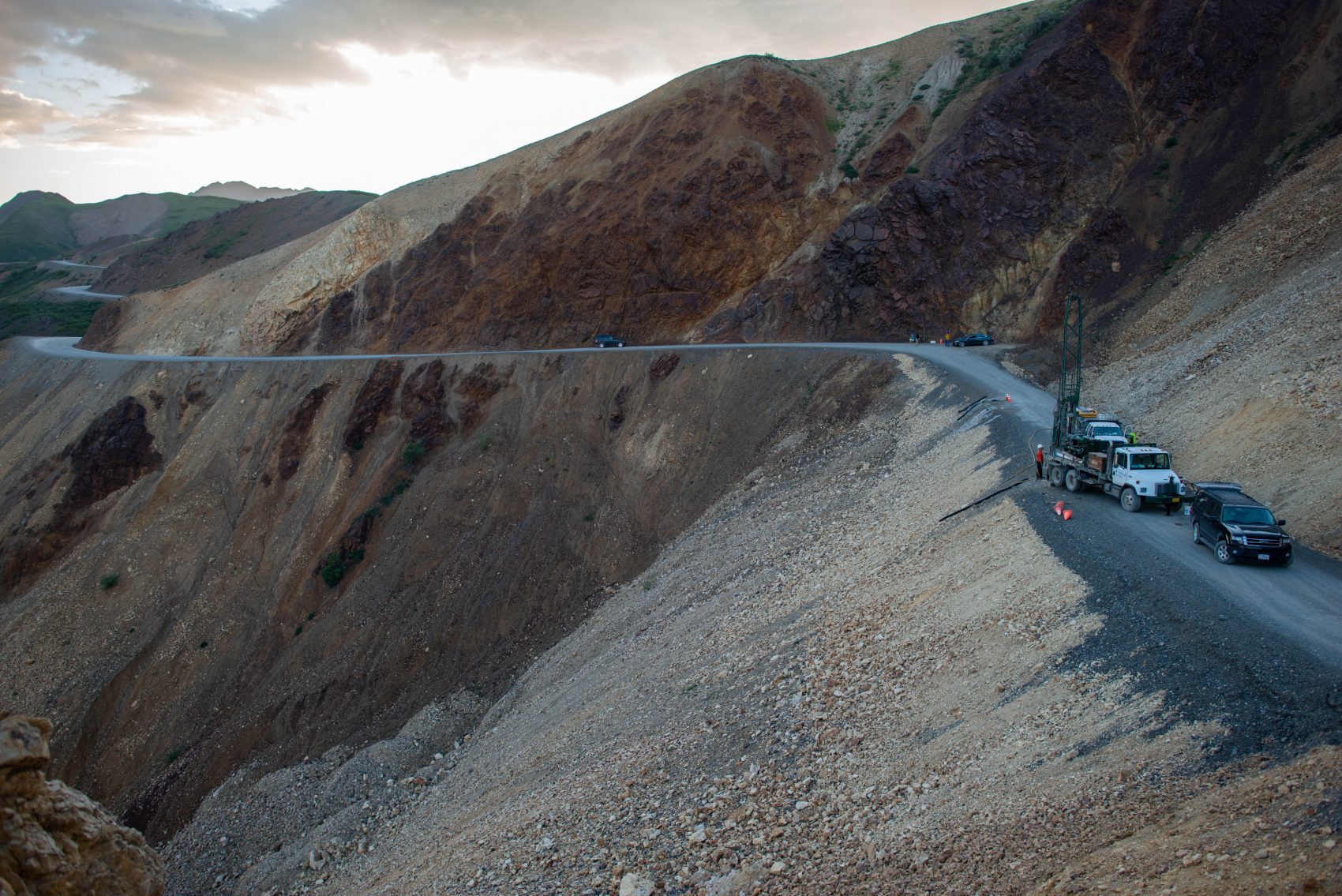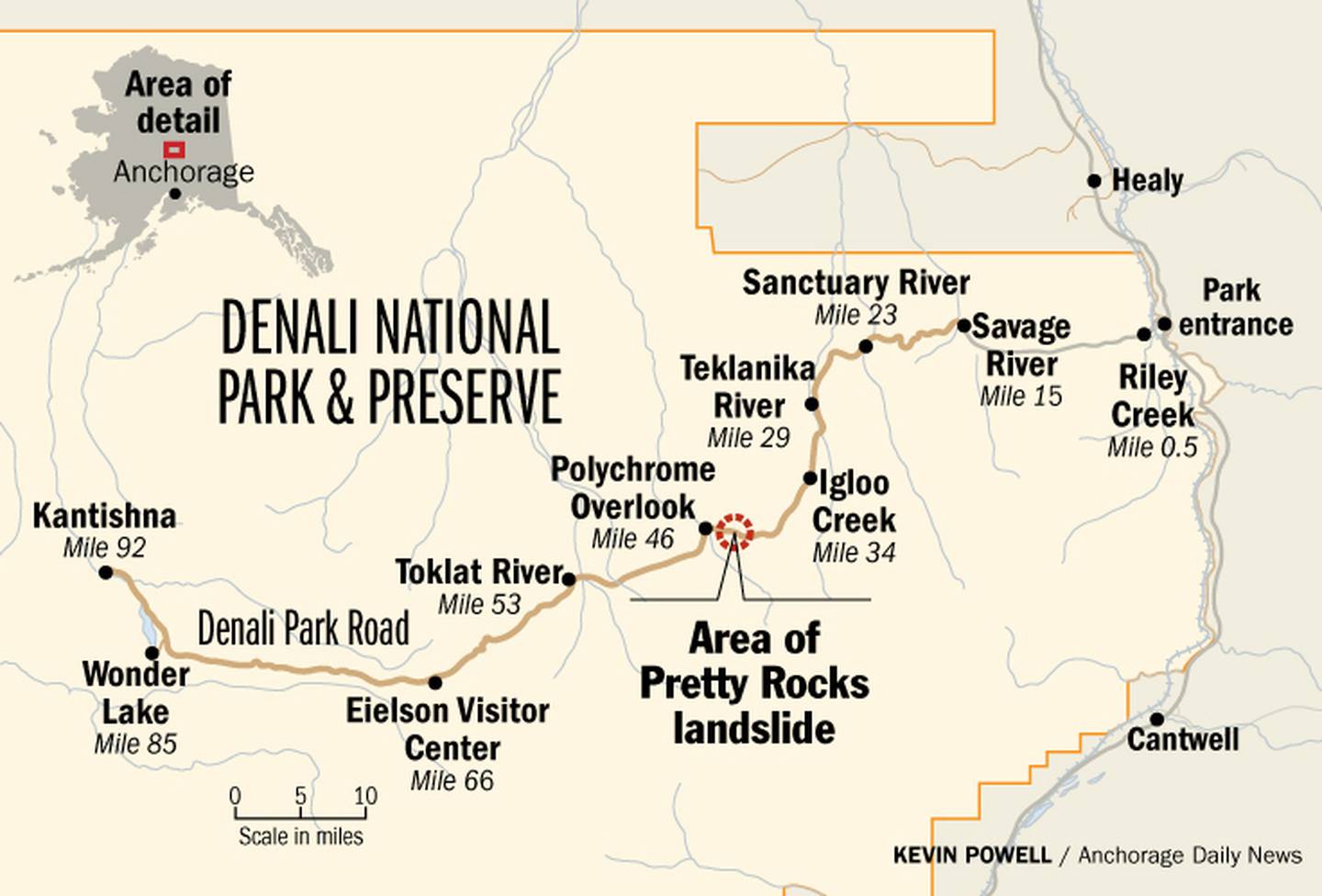
An ongoing landslide in Denali National Park has prompted park officials to close the Denali Park Road for the rest of the season west of the 43-mile mark. Melting permafrost likely due to climate change has caused landslide movement rates that are “unprecedented in the history of the park road,” according to the National Park Service.
The 92-mile Denali Park Road is the only way to drive into the 4.7-million-acre national park. The continuing landslide at Pretty Rocks on Polychrome Pass near Mile 42 has caused rapid deterioration of the road in recent years, raising concern about how to maintain the road while safely accommodating visitors, Anchorage Daily News reports. According to a statement issued by the National Park Service:
“Changing climate is driving frozen ground to thaw, resulting in unpredictable and increasing landslide movement rates at Pretty Rocks that are unprecedented in the history of the park road. We cannot safely keep up with the accelerating rate of landslide movement caused by permafrost thaw currently occurring in association with the Pretty Rocks Landslide,” Don Striker, Denali’s Superintendent, said in the statement.
The Denali Park Road doesn’t normally close past the Teklanika Rest Area at Mile 30 until mid-September. Landslides at Pretty Rocks have been happening since at least the 1960s but they usually only cause small cracks in the road which require maintenance only every 2-3 years, according to the National Park Service’s statement. But in 2018, the downward movement of rocks, or ‘slumping,’ as geologists refer to it, increased to almost half an inch per day, and then to three and a half inches per day by August 2020. Then early August rains in 2021 likely increased that rate dramatically to now ten inches per day, according to the NPS.
“Climate change, with its associated warmer winter temperatures and increased precipitation, has taken what was previously a problem solved by maintenance staff performing road repairs and made a challenge too difficult to overcome with short-term solutions,” according to the NPS news release. “The President’s Fiscal Year 2022 Budget Request for the National Park Service identifies specific funding for a construction solution at Polychrome Pass to ensure access is maintained. The project is currently in planning and design so construction would not likely begin until at least 2023.”
Westbound traffic beyond Mile 43 on the Park Road is currently only allowed for essential purposes, like facilitating seasonal closure of western park operations, the park service said. The full NPS news release can be read below.

News Release: Denali National Park Closes Section of Park Road Due to Landslide Activity
Denali National Park and Preserve announced that a portion of the 92-mile Denali Park Road will close today due to a fast-moving landslide creating unsafe road conditions at Polychrome Pass. The Denali Park Road typically closes to vehicle traffic beyond the Teklanika Rest Area (mile 30) in mid-September.
The vast majority of Denali National Park remains open for visitors. Buses will continue to allow access to Mile 42 of the Denali Park Road, the Denali Visitor Center continues to provide daily ranger services, and front-country trails and backcountry access remain open. The Kantishna airstrip also remains open.
Beginning today, August 24, westbound traffic beyond mile 43 of the Denali Park Road will be restricted to essential travel to facilitate the seasonal closure of western park operations, including private lodges and inholdings located in the Kantishna area. All visitors currently camping in the Wonder Lake Campground and in backcountry areas west of Polychrome Pass will be relocated east of the closure over the next few days. Effective immediately, camper buses will not be available for backcountry trips past mile 42, near the East Fork Bridge. Park tour and transit buses will also continue to operate, but will turn around at mile 42.
“Changing climate is driving frozen ground to thaw, resulting in unpredictable and increasing landslide movement rates at Pretty Rocks that are unprecedented in the history of the park road. We cannot safely keep up with the accelerating rate of landslide movement caused by permafrost thaw currently occurring in association with the Pretty Rocks Landslide,” said Don Striker, Denali’s Superintendent. “The National Park Service is actively working with the Federal Highway Administration and other partners on a long-term solution to maintain road access at Pretty Rocks corner and across Polychrome Mountain.”
What’s closed in Denali National Park:
- The Denali Park Road west of mile 43 (East Fork Bridge) will be closed on August 24th to non-essential vehicles, as well as all pedestrian and bicycle traffic.
- Wonder Lake Campground (mile 89) will be closed on August 24th for the remainder of the season.
- Eielson Visitor Center (mile 66) will be closed on August 24th for the remainder of the season.
“With our partners, we will shift to allow for a full experience along the portion of the road east of the landslide. Visitors will continue to have access to great wildlife viewing, views of Denali, front-country trails, and backcountry hiking and camping,” said Brooke Merrell, deputy superintendent.
Landslides have impacted Pretty Rocks since at least the 1960s but until recently, only required maintenance every 2-3 years. During the 1990s, the landslide, which occurs below the roadbed, only caused small cracks in the road surface. However, by 2018 the slumping increased to almost half an inch per day, and then to three and a half inches per day by August 2020. Early August rains in 2021 appear to have triggered the rate to increase significantly, with much of the landslide currently moving downhill at over ten inches per day.
Climate change, with its associated warmer winter temperatures and increased precipitation, has taken what was previously a problem solved by maintenance staff performing road repairs and made a challenge too difficult to overcome with short-term solutions. The President’s Fiscal Year 2022 Budget Request for the National Park Service identifies specific funding for a construction solution at Polychrome Pass to ensure access is maintained. The project is currently in planning and design so construction would not likely begin until at least 2023.